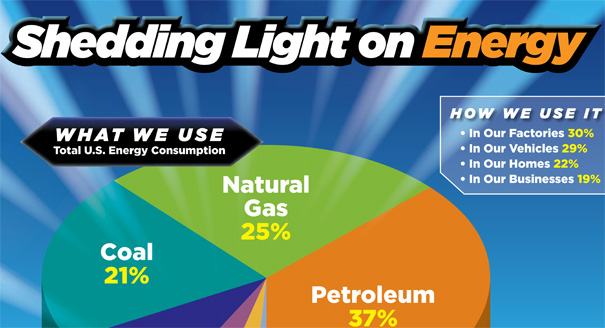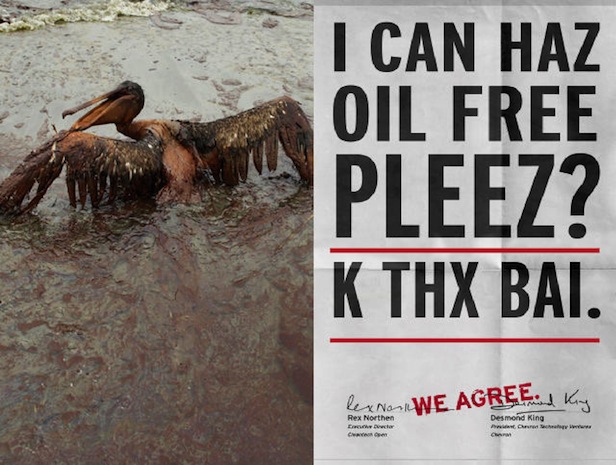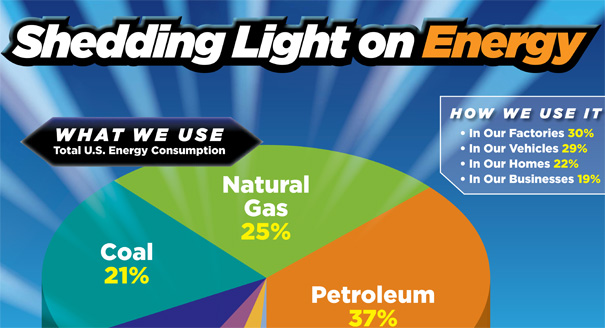 Image: Scholastic, U.S. Chamber [PDF]Cross-posted from the Natural Resources Defense Council.
Image: Scholastic, U.S. Chamber [PDF]Cross-posted from the Natural Resources Defense Council.
Politico reports that the Scholastic company — producer and distributor of a wide range of educational products to our nation’s school systems — has teamed up with the U.S. Chamber of Commerce on an “educational” program about U.S. energy consumption.
In the article, entitled “Chamber: Worry about energy regulations, kids,” Politico writes:
The U.S. Chamber of Commerce wants middle school students to consider what would happen if government regulations shut down the coal industry or another domestic energy source.
The question is part of a teaching guide the group plans to distribute to roughly 100,000 classrooms across the country as part of its “Shedding Light on Energy” program with educational publisher Scholastic Inc.
“What do you think could happen if one of our energy sources was suddenly unavailable (e.g., power plant maintenance, government curb on production, etc.)?” the guide asks.
Chamber officials maintain that there is no “hidden agenda” behind the question or the educational outreach effort in general. But given the current political climate surrounding the Environmental Protection Agency’s efforts to regulate greenhouse gas emissions, the group’s direct involvement in public school education is expected to make environmentalists and like-minded progressives uncomfortable.
Actually, the fact that Scholastic is using its wholesome name to traffic the U.S. Chamber of Commerce’s pollution-friendly propaganda should be alarming to anyone with kids in the public school system. (I have two.) In fact, the hypocrisy embedded in the U.S. Chamber’s involvement in producing education materials on energy for kids is downright shocking.
What makes the U.S. Chamber such an inappropriate partner in child education?
One reason is that the Chamber’s information is extremely one-sided. It neglects to mention the public health, environmental, and national security consequences of our reliance on dirty energy sources. The coal and oil which supply a great deal of our energy also create extraordinary amounts of air, water, and soil pollution, and of course are primarily responsible for the warming of our planet. Our addiction to oil makes the U.S. vulnerable to oil-producing nations that wish us harm. These are consequences that today’s kids will have to deal with as tomorrow’s leaders.
It is puzzling that Scholastic is willing to align itself with incomplete and biased material, especially since its own “Kids’ Environmental Report Card” ranks global warming and other pollution issues as serious challenges kids want to take on.
But even more puzzling is why Scholastic would partner with an organization that has so little regard for the health and welfare of our nation’s kids. The U.S. Chamber of Commerce has a long track record of opposing common-sense public health protections, especially those intended to protect our children. A few examples:
- The U.S. Chamber has been a consistent opponent of efforts to reduce mercury pollution. Mercury is a dangerous neurotoxin that interferes with children’s brain development and can cause severe learning disorders. Unborn children are especially vulnerable — according to the EPA, “Impacts on cognitive thinking, memory, attention, language, and fine motor and visual spatial skills have been seen in children exposed to methylmercury in the womb.”
Despite the dangers, the Chamber’s answer has been to rely on misinformation as a tool to oppose stricter standards.
So … the U.S. Chamber of Commerce, which opposes measures that would limit our children’s exposure to mercury, which is known to cause serious learning disorders, is producing educational materials for kids?
- The U.S. Chamber is currently opposing tighter standards to reduce smog or ground-level ozone, a widespread pollution problem responsible for a range of health effects to which children are especially vulnerable. Smog pollution contributes to thousands of premature mortalities every year and is a known cause and trigger for respiratory problems like asthma, a disease that is spreading most rapidly in children younger than 17 years old, who also account for the highest overall rates of asthma among the population at large.
The U.S. EPA is working to tighten standards for this kind of pollution in order to prevent as many as 12,000 deaths per year and thousands of other effects, but the U.S. Chamber is trying to block these crucial health protections.
Making this even more ironic is the fact that the tighter standards the Chamber is trying to block would reduce by over 2 million the number of days of school kids miss due to air-pollution related illnesses. Hey, how are the kids supposed to read the Chamber’s communiqués if they are gasping for breath in the emergency room?
- The U.S. Chamber has urged Congress to oppose efforts to ban dangerous chemicals commonly found in children’s toys. Phthalates are chemicals used in many common consumer products, including as softeners of plastic children’s toys — like a rubber ducky.
As NRDC’s Sarah Janssen explains, “Some phthalates are hormone-disrupting chemicals that interfere with production of the male hormone testosterone, and have been associated with reproductive abnormalities.”
Yet the U.S. Chamber opposes protecting children from these dangerous chemicals, explaining in one letter to Congress that “Manufacturers would be forced to use more expensive alternatives that may unfairly subject them to additional safety and legal liability concerns.”
Scholastic’s decision to partner with the U.S. Chamber is all the more disappointing because it does include environmental education resources (full disclosure, including some links to NRDC.)
So what can you do about this? You can let Scholastic’s CEO and executives know that you are concerned about the partnership with the U.S. Chamber and ask them
to stop the program. Here’s how you can reach them (and a sample note is below).
Write these top Scholastic executives:
- Richard Robinson, President and CEO (rrobinson@scholastic.com)
- Dina Paul-Parks, Education and Libraries (ssinek@scholastic.com)
- Cathy Lasiewicz, Community Affairs and International (clasiewicz@scholastic.com)
- Kyle Good, VP, Corporate Communications (kgood@scholastic.com)
- Sara Sinek, Consumer Marketing (ssinek@scholastic.com)
If you prefer snail mail:
Scholastic
557 Broadway
New York, NY 10012
Or a phone call:
(212) 343-6100
SAMPLE LETTER
Dear Mr. Robinson and Scholastic,
I am writing to express my concern about Scholastic’s “Shedding Light on Energy” partnership with the U.S. Chamber of Commerce.
The materials that have been made public fail to shed much light on the critical consequences of our energy use and fail to challenge students to think of creative solutions to our energy problems. They also appear to neglect topics that Scholastic’s own “Kids’ Environmental Report Card” identifies as important.
In addition, the U.S. Chamber has a long record of opposing efforts to protect children from dangerous chemicals and pollutants like mercury, smog, and phthalates.
Kids today will be our leaders tomorrow. We owe them — and ourselves — better than what the U.S. Chamber materials have to offer.
I urge you to end the partnership with the U.S. Chamber, and to recall and recycle all materials printed and distributed in association with it.
Please let me know what you plan to do.
Sincerely,
Your name, address, and zip



